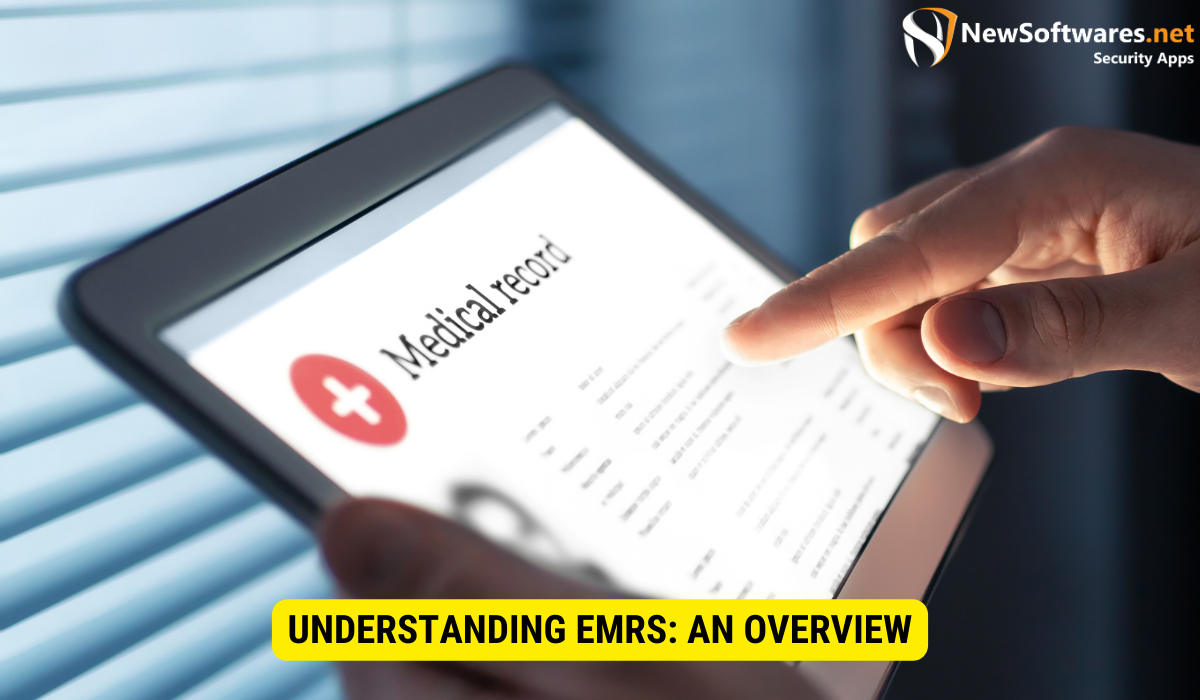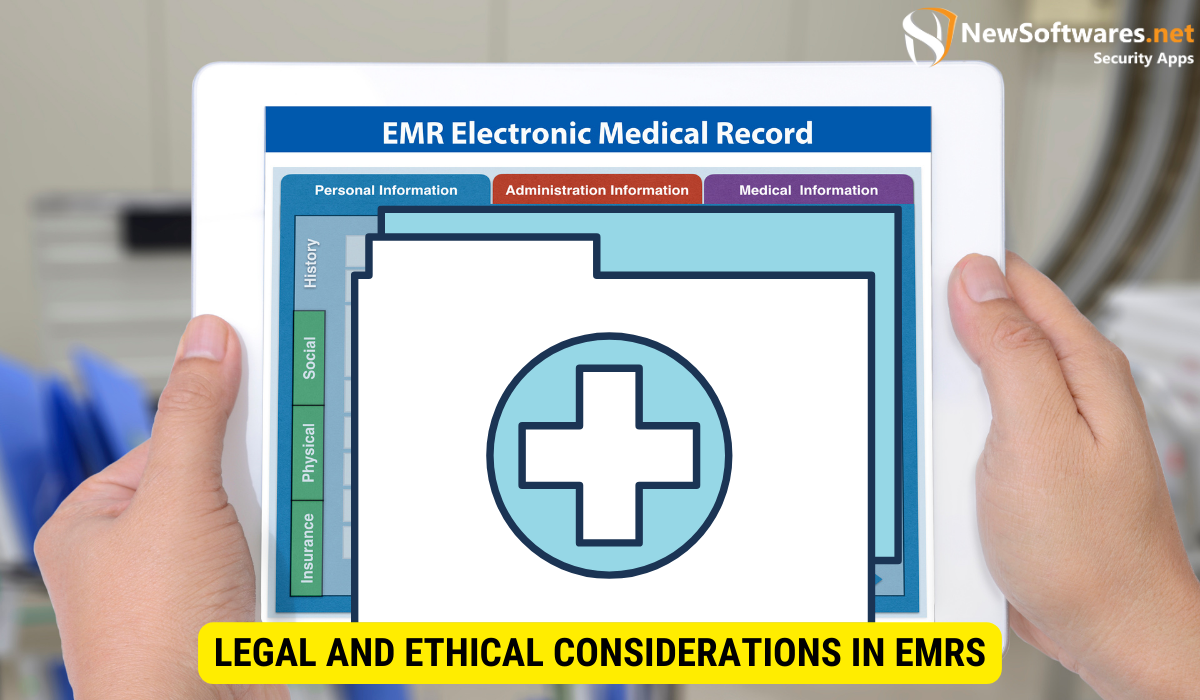EMRs (Electronic Medical Records) enhance privacy and security in patients’ data through data encryption, access control, audit trails, data backup, and protection against unauthorized access.
“EMRs, or Electronic Medical Records, play a crucial role in enhancing patient data privacy and security. Understanding the importance and functionalities of EMRs is essential to ensure the confidentiality and protection of sensitive health information.”
Understanding EMRs: An Overview

Electronic Medical Records, commonly known as EMRs, refer to digital versions of a patient’s medical history, treatments, and healthcare interactions. These records serve as a comprehensive repository of patient information, accessible to authorized healthcare providers. EMRs have revolutionized the health care industry by streamlining data management, improving patient care, and enhancing privacy and security measures.
With the progress of technology, the health care business has witnessed a significant shift from traditional paper-based medical records to electronic systems. This transition has brought numerous benefits, transforming how healthcare professionals manage and utilize patient information.
EMRs have become an integral part of modern healthcare systems, offering a multitude of advantages for both patients and healthcare providers. By digitizing medical records, EMRs eliminate the need for physical storage space, reducing the risk of misplacement or damage to important documents. Additionally, EMRs allow for easy retrieval of patient information, saving time and effort that would otherwise be spent searching through stacks of paper records.
Defining Electronic Medical Records (EMRs)
At the core, EMRs are digital versions of traditional paper-based medical records. These electronic records contain a wide range of patient data, including demographics, medical history, allergies, prescriptions, laboratory results, imaging reports, and treatment plans. Unlike paper records, EMRs offer enhanced accessibility, real-time updates, and improved data security measures.
One of the key advantages of EMRs is their ability to capture and store huge amounts of patient data. From basic demographic information such as age, gender, and contact details to complex medical records including diagnoses, procedures, and medication history, EMRs provide a comprehensive overview of a patient’s health journey. This wealth of information enables healthcare providers to make informed decisions, tailor treatment plans, and monitor progress more effectively.
Furthermore, EMRs allow for seamless integration with other health care systems, such as laboratory information systems and radiology systems. This integration enables healthcare professionals to access test results, images, and other diagnostic information directly from the EMR, eliminating the need for manual retrieval and reducing the danger of errors or delays in treatment.
The Role of EMRs in Healthcare
EMRs are designed to improve the quality and efficiency of healthcare delivery. They provide clinicians instant access to patient information, enabling better decision-making, accurate diagnoses, and more personalized care. Additionally, EMRs facilitate information exchange between healthcare providers, improving coordination in patient treatment and reducing medical errors.
With EMRs, healthcare providers can quickly access a patient’s medical history, including previous diagnoses, medications, and treatments. This comprehensive view allows for a more holistic approach to healthcare, ensuring that all aspects of a patient’s health are considered when making treatment decisions. EMRs also support evidence-based medicine, as healthcare providers can easily access research studies, clinical guidelines, and best practices directly from the system.
Moreover, EMRs play a crucial role in enhancing patient safety. By providing health care providers with accurate and up-to-date information, EMRs help reduce medication errors, allergic reactions, and adverse events. EMRs also enable healthcare professionals to track and monitor patient progress over time, ensuring that treatments are effective and adjustments can be made if necessary.
In conclusion, EMRs have revolutionized the healthcare industry by digitizing and centralizing patient information. The benefits of EMRs are far-reaching, improving data management, enhancing patient care, and strengthening privacy and security measures. As technology advances, EMRs will continue to evolve, shaping the upcoming of health care delivery and improving patient outcomes.
Importance of Privacy and Security in Patient Data
Ensuring patient data’s privacy and security is paramount in healthcare. EMRs (Electronic Medical Records) are designed with robust security measures to safeguard sensitive information from unauthorized access, cyber-attacks, and data breaches. Let’s explore the value of patient confidentiality and potential risks to data security.
The Value of Patient Confidentiality
Patient confidentiality is a fundamental principle in healthcare that fosters trust and ensures open communication between patients and healthcare providers. It is the cornerstone of the patient-provider relationship, enabling patients to share their personal health information without fear of judgment or disclosure.
EMRs are crucial in maintaining patient confidentiality by restricting access to authorized personnel only. This means that healthcare providers, such as doctors, nurses, and administrative staff, are the individual ones who can access and view patient records. Implementing strict access controls, EMRs help protect patient privacy, preserve their dignity, and maintain professional ethics.
Moreover, patient confidentiality is not just about protecting personal information but also safeguarding sensitive medical details. EMRs ensure that medical histories, diagnoses, treatment plans, and other confidential information are securely stored and accessible only to authorized individuals. This level of privacy is essential for patients to feel comfortable sharing their complete medical history, enabling health care providers to make accurate diagnoses and provide appropriate treatment.
Potential Risks in Data Security
While EMRs offer numerous benefits in terms of efficiency and accessibility, it is important to be aware of potential risks to data security. Any breach of patient information can have severe consequences, including compromised privacy, identity theft, and financial fraud.
Cyber-attacks pose a significant threat to patient data security. Hackers are constantly evolving tactics to exploit healthcare system vulnerabilities and gain unauthorized access to sensitive information. This can lead to the theft of personal data, such as social security numbers, addresses, and insurance details, which can then be used for malicious purposes.
Another risk to data security is the improper handling of physical records. In healthcare facilities, there is always a risk of unauthorized individuals gaining access to patient records if they are improperly stored or disposed of. This can occur through theft, negligence, or human error.
Furthermore, there is also the potential for internal breaches of data security. Employees with authorized access to patient records may intentionally or unintentionally misuse or abuse their privileges. This can include accessing records without a legitimate reason, sharing patient information with unauthorized individuals, or failing to follow proper security protocols.
Stringent security measures are necessary to mitigate these risks and protect patient data. This includes implementing robust firewalls, encryption techniques, and access controls within EMR systems. Regular security audits, staff training, and strict data handling and disposal policies are also crucial in maintaining data security.
In conclusion, patient confidentiality and data security are essential components of healthcare. EMRs are vital in maintaining patient confidentiality, ensuring sensitive data is accessible only to authorized individuals. However, it is important to remain vigilant and address potential risks to data security to protect patient privacy and prevent unauthorized access or breaches.
How EMRs Enhance Privacy?
EMRs employ various techniques to enhance privacy and protect patient information from breaches or unauthorized use. Two critical components of ensuring privacy are data encryption and access control.
Data Encryption and Access Control
Data encryption is a vital safekeeping measure that converts patient information into a coded format, making it unreadable to unauthorized users. EMRs utilize sophisticated encryption algorithms to prevent data breaches and ensure that only authorized individuals can access and decrypt the information. Access control further strengthens privacy by allowing healthcare providers to assign different access privileges to ensure that only personnel with a legitimate need can view or modify specific patient data.
Audit Trails in EMRs
Another privacy-protecting feature of EMRs is the use of audit trails. Audit trails track every access and action performed on patient records, including who accessed the record, when it was accessed, and any modifications made. These trails help identify inappropriate access or actions, promoting accountability and ensuring that any breaches or unauthorized activities are traceable.
How EMRs Improve Security?
In addition to enhancing privacy, EMRs are designed to improve the overall security of patient data. Key security features include data backup, recovery mechanisms, and protection against unauthorized access.
Data Backup and Recovery Features
EMRs include robust data backup and recovery mechanisms to prevent data loss in case of system failures, natural disasters, or other unforeseen events. Regular backups ensure that patient information is safeguarded and quickly restored to its previous state, minimizing potential disruptions to patient care.
Protection Against Unauthorized Access
EMRs incorporate measures to protect against unauthorized access to patient data. This includes user authentication mechanisms such as passwords, multi-factor authentication, and biometric access controls. Utilizing these security measures helps prevent unauthorized individuals from obtaining sensitive patient information and ensures that only authorized personnel can access and modify patient records.
Legal and Ethical Considerations in EMRs

Implementing EMRs also requires adherence to various legal and ethical considerations. Healthcare providers, administrators, and technology vendors must comply with health information privacy laws and observe ethical guidelines for EMR use.
Health Information Privacy Laws
Health information privacy laws, for instance the Health Insurance Portability and Accountability Act (HIPAA) in the United States, set standards for protecting patient data. These laws impose strict regulations on healthcare entities, ensuring that patient information is appropriately secured, disclosed only as necessary, and that patients have control over their data.
Ethical Guidelines for EMR Use
Ethical guidelines for EMR use emphasize the responsible and appropriate handling of patient information. These guidelines promote transparency, respect for patient autonomy, and the ethical use of technology in healthcare. Following these guidelines ensures that EMRs are utilized ethically, maintaining patient trust and confidence in the healthcare system.
Key Takeaways
- EMRs (Electronic Medical Records) play a pivotal role in enhancing the privacy and security of patient data in healthcare.
- EMRs improve privacy through data encryption and access control, ensuring only authorized personnel can access and modify patient information.
- EMRs enhance security through data backup and recovery mechanisms, and protection against unauthorized access.
- Adhering to health information privacy laws and ethical guidelines is essential when implementing EMRs.
FAQs
How do EMRs enhance privacy and security?
EMRs enhance privacy and security through data encryption, access control, audit trails, data backup, and protection against unauthorized access.
What is the value of patient confidentiality?
Patient confidentiality ensures trust, open communication, and the protection of sensitive health information. It allows patients to share their health concerns with healthcare providers without fear of unauthorized disclosure.
What potential risks exist in data security?
Potential risks in data security include breaches, unauthorized access, cyber-attacks, identity theft, and financial fraud. Protecting patient data from these risks is critical to maintaining privacy and security.
How do audit trails contribute to privacy protection?
Audit trails in EMRs record and track access and actions on patient records, promoting accountability and traceability. They help identify any inappropriate access or actions, ensuring privacy protection.
Conclusion
Electronic Medical Records (EMRs) are essential in healthcare for enhancing patient data privacy and security. They achieve this through various measures like data encryption, access control, audit trails, data backup, and protection against unauthorized access. Adherence to legal and ethical considerations is crucial for responsible EMR implementation and maintaining patient trust in the healthcare system.
